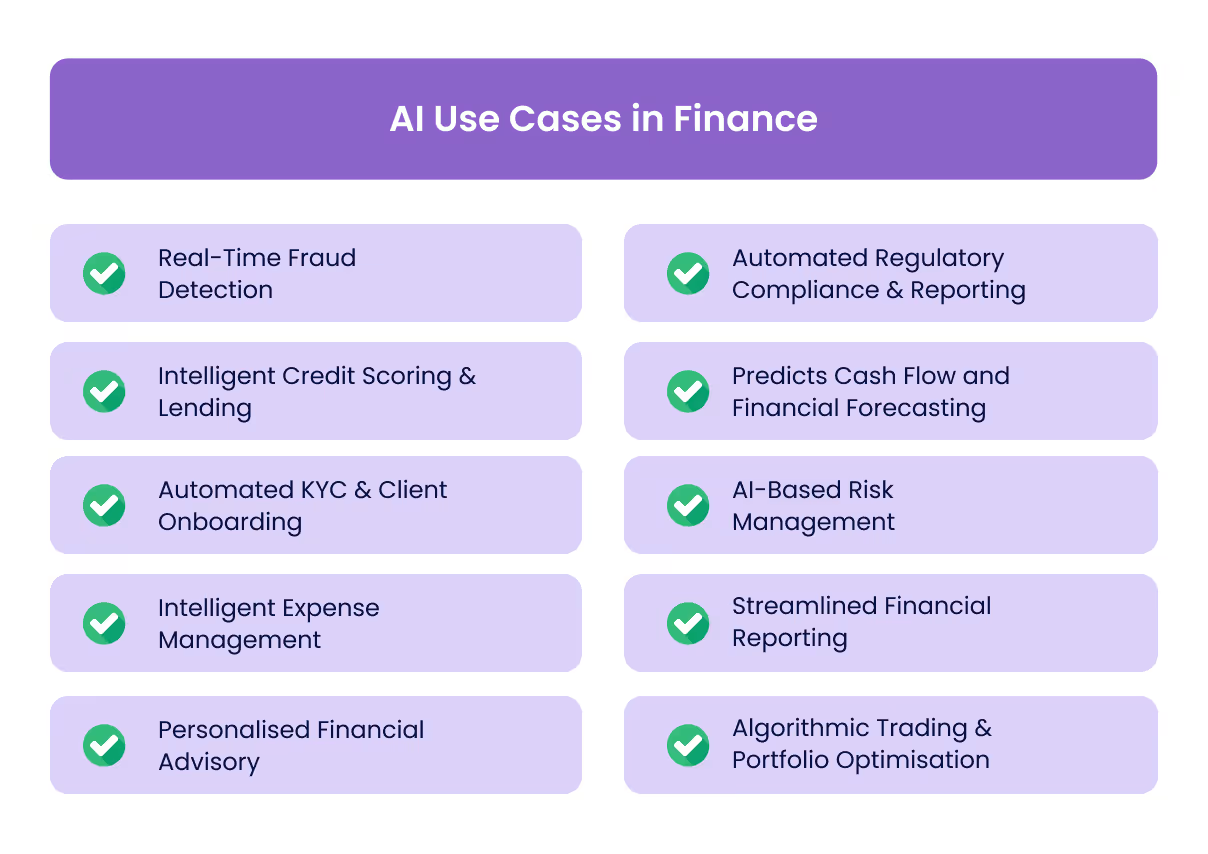The rapid integration of artificial intelligence (AI) is revolutionising the UAE’s financial sector, positioning it at the forefront of global fintech innovation. Currently, 42% of Emirati enterprises are integrating AI to automate regulatory compliance and strengthen anti-fraud frameworks.
Notably, 65% of UAE finance leaders report an accelerated pace of AI adoption in the past two years, driven by strict VAT and corporate tax requirements.
For finance executives, recognising the top AI use cases is important to improve operational resilience, meet local compliance standards, and safeguard business continuity.
This blog details the top-most impactful AI use cases in finance for 2025, offering actionable guidance for strategic decision-makers.
Key Takeaways
- UAE finance teams using AI for automated regulatory compliance outperform peers in audit readiness and operational resilience.
- AI-based fraud detection tools detect suspicious transactions in real time, greatly reducing financial losses and strengthening cross-border compliance.
- The most ROI-positive AI use cases in UAE finance are automated VAT reporting, predictive cash flow management, and enhanced credit scoring, each confirmed by regulatory bodies as priority focus areas.
What is AI in Finance?
It's better to start by defining AI in finance. Artificial intelligence in finance refers to the use of advanced computational models, such as machine learning, natural language processing, and neural networks. The models analyse large volumes of data, automate regulatory tasks, and enhance decision quality at unprecedented speed and accuracy.
Unlike rule-based software, AI solutions learn and improve from fresh data, allowing financial teams to address complex tasks, such as fraud detection, credit assessment, and compliance reporting, with speed and precision.
Key features of AI in finance:
- Instantly analyses large structured and unstructured data for risk, trading, and forecasting.
- Automates VAT compliance, invoice processing, reconciliations, and KYC to cut errors.
- Detects fraud and anomalies with adaptive models to minimise losses.
- Delivers personalised client insights and advisory.
- Enables proactive liquidity and credit risk decisions using accurate market data.
Also Read: The future of AI in Finance: How is AI reshaping the financial landscape?
Now that we know the basics of AI use cases in finance, let’s have a look at the practical applications of AI in finance.
AI Use Cases in Finance: The top 10 Practical Applications.

Increasing compliance demands and market complexity in the UAE have made targeted AI adoption a core strategic priority for finance leaders.
Below is an in-depth examination of the ten most advanced and impactful AI use cases that are directly enhancing operational resilience and regulatory conformity across UAE financial services.
1. Real-Time Fraud Detection
Real-time fraud detection utilises AI algorithms designed to continuously monitor transactions across multiple channels, including digital payments, wire transfers, credit card usage, and more.
By analysing vast transactional data streams through pattern recognition and anomaly detection techniques, AI systems can detect and flag irregular behaviour that deviates from established norms.
Key mechanisms include:
- Pattern Recognition: AI models learn from historical fraud data to establish baseline behavioural profiles for individual accounts, merchants, and transaction types.
- Anomaly Detection: Systems instantly flag transactions outside these patterns, such as unusual amounts or a rapid sequence of high-value payments, triggering automated alerts.
- Dynamic Model Updating: AI continuously refines its fraud detection algorithms by incorporating new fraud techniques and patterns emerging from global and regional cybercrime intelligence.
2. Automated Regulatory Compliance & Reporting
AI-based compliance platforms are tightly integrated with core financial systems to enforce UAE-specific VAT, AML, and corporate tax standards. AI scans invoices, contracts, and transaction records for compliance gaps against FTA and local legal requirements.
The platform generates real-time warnings for missing data, threshold breaches, or suspicious activity subject to further investigation.
When UAE regulations change (e.g., VAT rate updates or revised AML guidelines), AI engines instantly adapt reporting and validation workflows.
Key benefits include:
- Substantial time and cost savings during audits and ongoing supervision.
- Reduces human error and ensures 24/7 adherence to evolving statutory obligations.
- FTA inspection readiness is continuously maintained, minimising the risk of fines or regulatory censure.
3. Intelligent Credit Scoring & Lending
AI uses different data sources from bureau scores, payment histories, and behavioural analytics to power adaptive credit models. Machine learning algorithms assess both financial status and non-traditional indicators that better predict risk in underbanked segments.
The system learns and adapts with every new data point, ensuring scoring logic keeps pace with market, sector, and economic shifts.
The benefits of using AI for intelligent credit scoring are:
- It accelerates loan processing, reducing turnaround times for both retail and SME customers.
- Significantly expands credit access for underserved UAE market segments.
- Enhances portfolio risk management with more nuanced, UAE-relevant risk profiles.
4. Predicts Cash Flow and Financial Forecasting
AI-based cash flow tools analyse transaction history, seasonality, and pipeline commitments to predict future liquidity positions precisely. So the models simulate multiple inflow and outflow scenarios, using real customer, supplier, and contract data.
The automated notifications flag projected cash shortages so finance leaders can pre-empt liquidity gaps.
Benefits include:
- Proactive adjustment of funding and investment strategies.
- Sharpened visibility for meeting payroll, supplier payments, and regulatory dues.
- Supports confident growth planning in volatile trading environments.
5. Automated KYC & Client Onboarding
AI also simplifies onboarding by verifying identity documents, risk-scoring clients, and screening against global/UAE watchlists in real-time. The AI platforms instantly process Emirates ID, licences, and corporate documents via image recognition.
Further, it performs automated AML checks with sanctioned lists, politically exposed person (PEP) databases, and adverse media sources.
The benefits it provides are:
- Reduces onboarding timeframes from days to minutes.
- Maintains a digital audit trail for Central Bank compliance.
- Lowers operational onboarding costs and error risk.
6. AI-Based Risk Management
AI applications run portfolio and stress tests, and manage exposures with real-time responsiveness. The AI simulates regulatory audit shocks and market swings to identify weak spots.
It provides continuous, up-to-date reports on credit, operational, and market risk concentrations.
The benefits it offers are:
- Early identification and mitigation of vulnerabilities.
- Strengthens resilience, particularly in high-growth or disruptive market segments.
- Enhances regulatory capital efficiency.
7. Intelligent Expense Management
AI automates receipt capture, validation, and coding against bespoke UAE expense categories. It instantly flags and blocks non-compliant expenditure (e.g., out-of-policy claims, VAT misclassification).
The benefits it offers are:
- Tightens cost control and supports strategic procurement.
- Provides a comprehensive, always-on audit trail.
- Improves budgeting accuracy and accountability.
8. Streamlined Financial Reporting
AI standardises, reconciles, and compiles multi-entity financials to UAE reporting formats. It auto-extracts data from varied finance systems, mapping to local chart of accounts standards. Flag inconsistencies before submission.
Benefits are:
- Shortened month-end and statutory closing cycles.
- Audit-ready, FTA-compliant outputs with minimal manual intervention.
- Facilitates group and cross-border reporting.
9. Personalised Financial Advisory
AI robo-advisors and digital wealth managers customise product and investment strategies based on customer behaviours and preferences. It does risk profiling by deep analysis of spending, saving, and investment actions, mapped to real-world UAE scenarios and Shariah compliance needs.
It also recommends portfolios and products responsive to UAE capital market events and regulatory shifts.
Benefits:
- Brings bespoke, regulator-aligned advisory to a broader client base.
- Drives cross-sell/upsell opportunities for financial institutions.
- Deepens engagement in a competitive advisory landscape.
10. Algorithmic Trading and Portfolio Optimisation
AI trading platforms execute and optimise trades and asset allocations, leveraging real-time GCC and global market feeds. The AI platform reacts instantly to market signals and breaking news. Adjusts allocations based on pre-set risk and compliance parameters.
The benefits it offers are:
- Enhances trading returns in volatile and fragmented regional markets.
- Supports compliance with market abuse, liquidity, and conduct regulations.
- Delivers institutional-grade asset management capabilities to local and regional firms.
Also Read: What is finance automation?
With the transformative potential of AI in finance clearly established, it is crucial to understand the key stakeholders who drive AI adoption, governance, and operational integration within this complex ecosystem.
Key Stakeholders of AI in Finance
Successful AI adoption in the UAE’s finance sector hinges on coordinated efforts among critical stakeholders, each balancing innovation with stringent regulatory demands.
These key participants collectively drive AI strategy, implementation, compliance, and risk management, ensuring AI delivers measurable business impact while adhering to UAE-specific regulatory frameworks such as VAT, AML, and corporate tax laws.
Below are mentioned the key stakeholders in AI finance adoption:
- Executive Leadership: CFOs, CEOs, and board members establish strategic priorities, allocate budgets, and ensure integration of AI initiatives aligns with business performance targets and regulatory frameworks specific to the UAE.
- Technology Leadership: CIOs and CTOs select, secure, and oversee technical integration, ensuring that AI platforms are robust, scalable, and compliant with internal and external requirements—especially concerning data privacy and legacy infrastructure.
- Compliance Officers and Risk Managers: These professionals continuously monitor AI outputs for accurate regulatory alignment across VAT, AML, and the UAE’s evolving corporate tax landscape, mitigating legal and reputational risks.
- AI Vendors and Technology Partners: Solution providers supply the technical expertise, customisation, and ongoing support required to adapt AI tools to the UAE’s operational and regulatory realities.
- Regulators and Policymakers: Authorities such as the UAE Central Bank and Dubai Financial Services Authority (DFSA) issue governance guidance, conduct supervision, and enforce ethical AI use, underpinning market integrity and stakeholder trust.
To successfully apply these use cases, one must adopt clear and tailored methods specific to one's operational context. Let’s explore them.
Proven Best Practices for Applying AI in Finance
To reliably deliver value with AI in finance, projects must be carefully engineered and governed from the outset. Alignment with VAT, AML, and corporate tax requirements is non-negotiable; oversight and process discipline minimise risk and unlock operational benefits across the business.
Key best practices are:
- Establish Cross-functional AI governance committees to define AI strategy, oversee compliance adherence, manage risk assessments, and coordinate between finance, IT, legal, and compliance teams to ensure responsible AI deployment.
- Establish clear AI accountability and ethical guidelines to ensure transparency and fairness in all automated decisions.
- Select AI vendor partners with demonstrable expertise in UAE financial regulations and local business nuances.
- Continuously upskill finance teams in AI tools, data literacy, and change management to sustain adoption and build internal capabilities.
- Use scalable, cloud-ready AI architectures to support flexible development and rapid integration with existing enterprise systems.
- Enforce robust data quality and security controls consistent with UAE data protection laws.
- Pilot new AI projects incrementally and validate impact, usability, and legal compliance before scaling.
- Maintain comprehensive documentation for all AI-driven processes to simplify audits and regulatory inspections.
- Develop contingency plans for AI disruptions, including manual override protocols and 24/7 monitoring.
- Review AI models regularly for bias, outdated logic, and legal compliance, embedding these checks in ongoing governance.
While AI provides remarkable efficiencies and insights in finance, organisations must address inherent challenges to protect compliance, trust, and operational stability.
AI Challenges in Finance and Tips to Overcome Them
AI adoption in finance faces multifaceted challenges, centred around data fragmentation, regulatory obligations, technological integration, and governance gaps. VAT, AML, and corporate tax laws necessitate transparent and auditable AI processes.
Data privacy laws demand encryption and strict controls, complicating data handling. Legacy system limitations hinder seamless AI integration.
Below are mentioned a few challenges that your organisation can face while implementing AI, along with the tips to overcome them:
1. Data fragmentation and poor quality
- It limits AI’s ability to generate accurate insights, leading to unreliable outputs and compliance risks.
- Tip: Implement comprehensive data governance frameworks with strong security, accuracy, and access controls aligned to UAE regulations.
2. Strict regulatory compliance demands
- Strict regulatory compliance for VAT, AML, and corporate tax demands AI processes that are transparent, auditable, and continuously updated.
- Tip: Form multidisciplinary AI oversight committees including legal, risk, compliance, finance, and IT to ensure transparent and auditable processes.
3. Integration difficulties with legacy systems
- Legacy IT systems often lack integration capabilities, causing data silos that hinder AI deployment and scalability.
- Tip: Leverage modern API-driven architectures to enable seamless data standardisation and integration across systems.
4. Algorithmic bias and governance gaps
- Biased algorithms and weak governance frameworks can lead to unfair or legally non-compliant AI decisions.
- Tip: Develop ethical AI guidelines to mitigate bias, and conduct regular AI model reviews for fairness and compliance.
5. Lack of AI literacy and change resistance
- Limited AI knowledge and resistance to change among staff can stall adoption and reduce AI’s effectiveness.
- Tip: Invest in ongoing staff training and awareness programmes to build AI understanding and foster a culture of compliance.
6. Unplanned AI deployment risks
- Lack of structured AI implementation risks untested and inefficient deployments that may violate compliance or fail to deliver ROI.
- Tip: Adopt phased AI implementation with pilot projects to validate usability, impact, and regulatory adherence before scaling.
Alaan’s spend management platform provides a real example. Punjab National Bank’s UAE branch struggled with manual petty cash processes, leading to delays, errors, and limited oversight.
By deploying Alaan’s automated solution, the bank digitised petty cash handling, issued corporate cards, and enabled real-time transaction visibility. This resolved data fragmentation and compliance visibility issues, eliminated physical receipts, and empowered management with immediate, reliable spending analytics, directly addressing several of the core challenges faced by finance teams in the region.

Building on proven AI success stories, organisations can now use Alaan’s spend management platform to revolutionise finance operations with precision and compliance.
Transform Your Finance Operation with AI, Powered by Alaan
Alaan’s AI-based spend management platform addresses critical pain points in finance operations, particularly in the UAE’s regulatory environment. It automates expense approvals, enforces VAT compliance, and offers granular real-time spending visibility.
By digitising and centralising petty cash, invoices, and payments, Alaan reduces manual errors and audit risks while enhancing financial control.
Alaan’s AI-powered spend management platform is engineered to tackle the specific compliance and operational hurdles. Its capabilities include:
- Automated expense approvals that dramatically reduce processing time while enforcing precise VAT compliance, aligned with the UAE Federal Tax Authority standards.
- Real-time, granular visibility over all petty cash, invoice, and payment transactions, empowering finance teams with immediate, actionable control.
- Integrated corporate card management streamlines employee spending, captures every transaction instantly, and makes reconciliation seamless and error-free.
- Comprehensive audit trails and digital documentation, simplifying regulatory inspections, minimising manual intervention, and enhancing governance.
- API-first architecture for easy integration with existing ERP, accounting, and banking systems, ensuring secure, scalable, and unified data management.
- AI-driven analytics and spend insights to optimise budget management, flag anomalies, and inform strategic finance decisions.
- Centralised spend management platforms for procurement and payment approvals, reinforcing internal policies and improving supplier oversight.
Ready to elevate your finance team’s efficiency and compliance?
Schedule a free demo and talk to Alaan’s experts today and see what true, region-ready AI transformation can do for your business.
Conclusion
Artificial intelligence is no longer a future concept in the UAE’s financial sector; it is a present-day competitive differentiator.
From automating VAT reconciliation and corporate tax reporting to detecting fraud in real time and streamlining multi-entity expense management, AI is directly addressing the operational and compliance pressures unique to the UAE’s regulatory environment.
At Alaan, we understand the unique challenges finance teams face in the UAE and are passionate about helping you unlock the true potential of AI.
If you're ready to build a smarter, more agile finance operation, we're here to partner with you every step of the way.
Book a demo today! Let's transform the way you manage finance, so you can focus on what matters most: driving your business forward, every single day.
Frequently Asked Questions (FAQs)
1. How does AI improve financial risk assessment beyond traditional methods?
A: AI analyses diverse data sources in real time, identifies subtle patterns, and performs predictive modelling, enabling more accurate, dynamic risk evaluation compared to static traditional models.
2. What role does AI play in reducing financial fraud in cross-border transactions?
A: AI detects irregular behaviours and patterns across jurisdictions instantaneously, adapting to new fraud tactics, which helps prevent losses in complex cross-border finance operations.
3. Can AI ensure compliance with emerging UAE-specific financial laws automatically?
A: Yes, AI systems can be configured to update with regulatory changes swiftly, automating compliance checks against emerging VAT, AML, and tax rules specific to the UAE.
4. How does AI impact the efficiency of financial audit processes?
A: AI automates data extraction, anomaly detection, and cross-referencing, reducing manual labor and increasing audit accuracy and speed, enabling earlier risk identification.
5. What are the scalability considerations for AI in large financial institutions?
A: Scalable AI requires a strong architecture supporting modular deployment, seamless integration with legacy systems, and elastic processing power to handle growing data volumes without performance loss.
6. How can AI support tailored financial product offerings in the UAE market?
A: By analysing customer behaviour, preferences, and regulatory constraints, AI enables the creation of personalised and compliant financial products aligned with the UAE market demands.


.avif)







%201.avif)